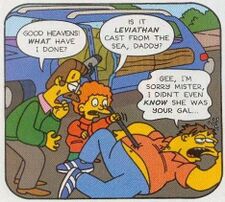
Around Town with Ned Flanders/References
Wikisimpsons - The Simpsons Wiki
< Around Town with Ned Flanders
Revision as of 03:07, November 17, 2018 by Mythigator (talk | contribs)
Cultural references
- When a fleeing Snake and pursuing Apu jump into Ned's car, Chief Wiggum sees them struggling and mistakes them for joyriders.
- When Apu lectures Ned, he says, "A Hindu manager and his money are not soon parted!" This is a reference to the proverb "A fool and his money are soon parted", attributed to the 16th-century English poet Thomas Tusser.
- Snake calls Ned "Kemosabe", Tonto's nickname for the Lone Ranger.
- The ending of the story, where a narration tells what happened to the individuals involved, is reminiscent of Dragnet.
- The FOX special in which Chief Wiggum appears, When Good Snacks Go Bad, is a parody of the three-part special When Animals Attack!, which aired on FOX in 1996.
- Pastor Pat's Revival Hall for Thumpin' and Holy Rollin':
- "Thumpin'" refers to the slang term "Bible thumper". In the church, it is used to refer to the practice of some preachers of thumping their hands on their Bibles to emphasize a point during a sermon. Outside the church, it is a derogatory slang term for Christians who are aggressive about sharing their beliefs.
- "Holy Rollin'" refers to "Holy Roller", a slang term which is used (generally in a derogatory fashion) to refer to the occasionally boisterous worship style of Pentecostal Christians.
- After Ned accidentally runs over Barney, Todd pokes him with a boom mike and asks, "Is it Leviathan cast from the sea, Daddy?" Todd's question refers to the Biblical Leviathan, which is mentioned several times in Scripture and described in detail in the 41st chapter of the Book of Job.
- Ned's refusing the local Emmy Award on the grounds that he can't accept any graven images is a reference to the Second Commandment (as counted by most Protestant denominations), which in the King James Version reads in part, "Thou shalt not make unto thee any graven image".
Trivia
- According to Ned Flanders, the history of the church in Springfield goes back to shortly after the town's founding by Jebediah Springfield—"Ol' heathen though he was", as Ned describes him.
- "The first church was built using logs, mud and the natives' teepees", says Ned.
- In the 1930s, the most prominent house of worship in Springfield was Pastor Pat's Revival Hall for Thumpin' and Holy Rollin'.
- Ned describes the present-day First Church of Springfield as "Reverend Lovejoy's modern glass sanctuary".
- Other historical points of interest in Springfield, according to Ned, include:
- The Underground Grapefruit Grotto
- The Westside Silent Dinner Theater
- The "biggest can-opener collection this side of the Mississippi"
- The Garden of Talking Statues at the Springfield Funeral Home
- None of the Simpson family members appear in the story.
Continuity
- The Dragnet-style ending was also used in the episode "Marge on the Lam".

